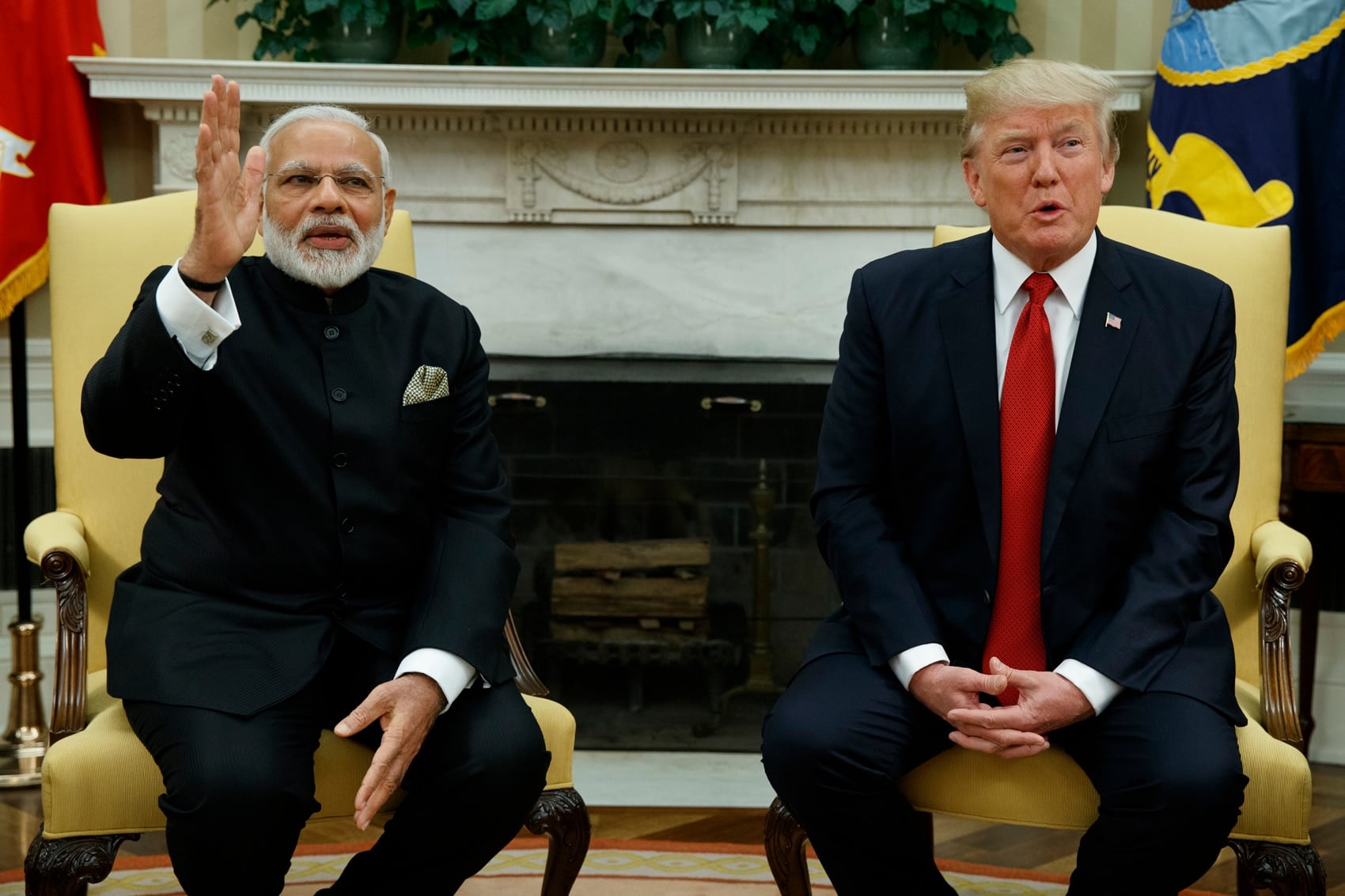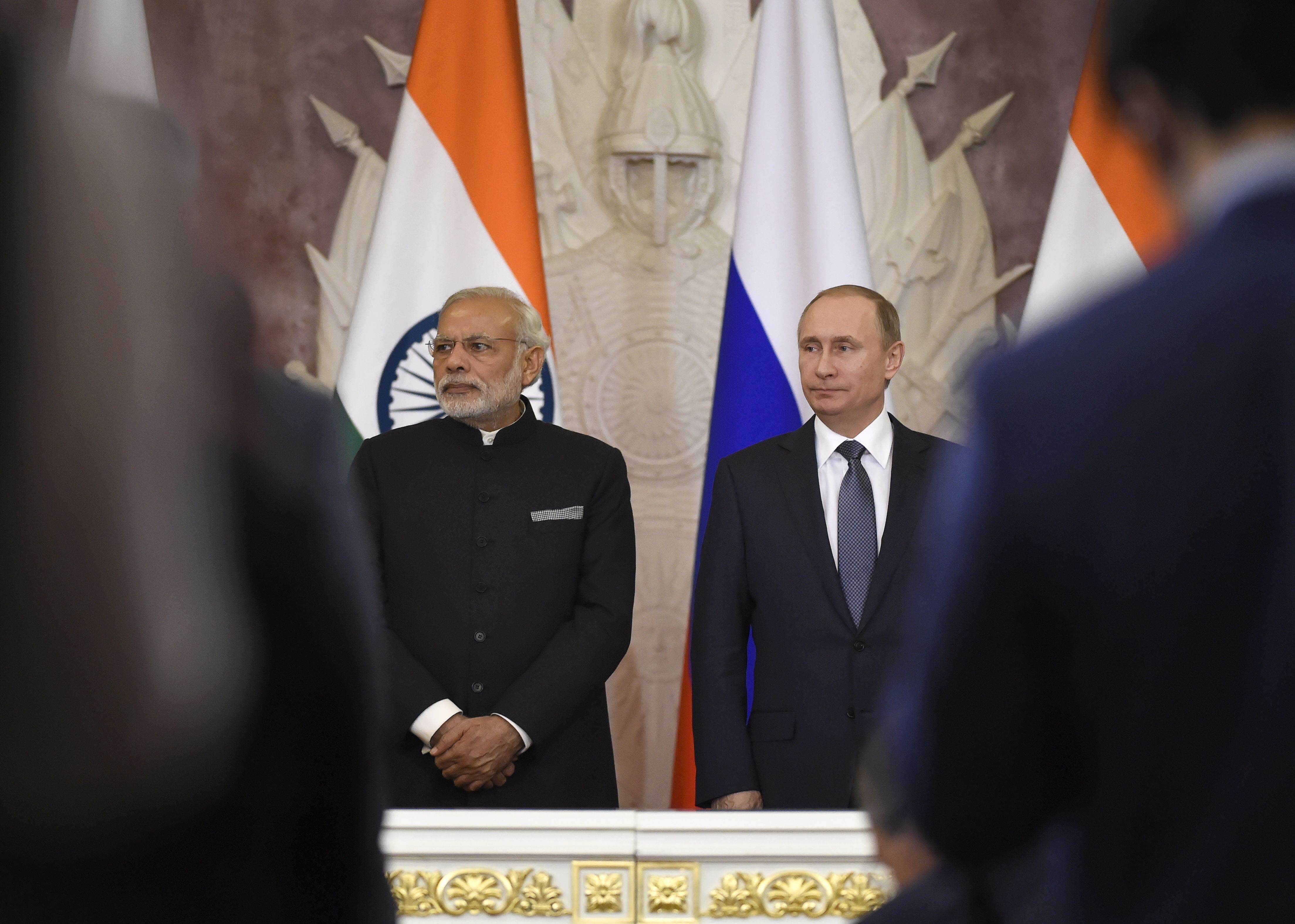WASHINGTON — Top U.S. lawmakers say they are working to find compromise over stiff Russia sanctions that will inadvertently threaten America’s defense relationships with India and other U.S. allies in Asia.
Amid the firestorm over President Donald Trump’s performance at Monday’s summit with his Russian counterpart Vladimir Putin, Senate Minority Leader Chuck Schumer, D-N.Y., that same day came out against a measure to allow the Trump administration to ease penalties against U.S. allies who buy Russian weapons.
Schumer demanded Republicans abandon their push for a legislative “loophole” for the penalties, mandated under the strict Countering America’s Adversaries Through Sanctions Act, or CAATSA, which is aimed at punishing Moscow for meddling in the 2016 U.S. election.
“Ratchet up sanctions on Russia, not water them down,” Schumer said in a floor speech Tuesday.
Proponents for a fix, on both sides of the aisle, argue that because the sanctions target countries who buy Russian arms, they imperil America’s alliances and access to defense markets in the Indo-Pacific region — undermining U.S. efforts to promote India as a counterweight to China.
How this is decided will be a test of Defense Secretary Jim Mattis’ clout on Capitol Hill. A popular figure among lawmakers, Mattis has lobbied for more flexibility, arguing that the sanctions will only drive strategic partners to buy more Russian hardware and prevent them from buying American in the future.
“The strongest argument for CAATSA being changed, in this instance, is Secretary Mattis,” Senate Minority Whip Richard Durbin, D-Ill., told Defense News on Wednesday. “He feels strongly about it, that it will bring India much closer to the United States, which is good for our security and our future. The competing interest is none of us wants to do anything that looks like it’s lifting our effective sanctions on Russia."
The debate is focused on the 2019 National Defense Authorization Act, as lawmakers work behind closed doors to resolve differences between the House version of the bill, which includes language to ease CAATSA, and the Senate version, which does not.
RELATED

A key supporter of Mattis’s request, House Armed Services Committee Chairman Mac Thornberry, R-Texas, was expected to meet Wednesday with Senate Armed Services Committee ranking member Jack Reed, D-R.I., to find middle ground, according to Durbin, who noted: “It’s tricky, I don’t know how it’s going to be resolved.”
Reed predicted a “very vigorous debate.”
“This would give Secretary Mattis leverage as he tries to pull countries away from Russian procurement to the U.S., and we’re going to discuss it to see if that makes sense,” Reed said.
Friendly fire
Passed overwhelmingly in the House and Senate last summer, CAATSA was designed both to hit Russia where it hurts most, its defense and energy businesses, and to compel the administration to act. It may be applied against any individual who “facilitates” an investment in Russia’s defense and intelligence sectors worth more than $10 million.
In April, Mattis asked lawmakers to permit special national security exemptions for U.S. allies who are buying Russian systems but intend to eventually stop, citing India, Vietnam and Indonesia.
Vietnam has a requirement for more combat aircraft to replace its aging MiG-21 and Su-22 aircraft, and its recent acquisitions of frigates, corvettes and submarines are almost all Russian designs. The country is unlikely to reorganize its military along Western lines anytime soon, given its funding constraints.
Since the end of the Cold War, India has come a long way toward diversifying its defense suppliers, with the U.S. serving as the principal beneficiary, according to an analysis co-authored by the Heritage Foundation’s Jeff Smith, a South Asia expert.
Over the past decade, India has purchased roughly $15 billion in U.S. defense equipment. From 2008 to 2012 Russia provided 79 percent of India’s arms imports while the U.S. accounted for only 2.7 percent, according to Stockholm International Peace Research Institute data. Over the next five-year period, Russia’s share plunged to 62 percent, while America’s share grew more than fivefold to 15 percent.
CAATSA’s tough language has jarred the government in India, and it certainly was not the intent of the bill’s authors’ to alienate allies, Smith said.
“By the admission of many people in Congress, they do not want to see India targeted,” Smith told Defense News. “They’ve gotten themselves in a position where the only way out is to give the administration greater flexibility.”
Instead of traditional waiver, the House passed a version of the NDAA containing a “special rule” to waive sanctions for 180 days for allies who have purchased Russian weapons. They must first have ended their relationship with Russia, be significantly scaling down that relationship or made other assurances about reducing that relationship.
RELATED

One of CAATSA’s chief architects, Senate Foreign Relations Committee Chairman Bob Corker, R-Tenn., agrees that Mattis should receive the flexibility he’s requested.
“Without the wavier, countries who are trying to move from Russian equipment to American equipment have to make an immediate binary choice, and we fear this may inadvertently push countries like India closer to Russia if they can’t get parts for their existing Russian equipment,” said Corker’s chief of staff, Todd Womack.
As Trump has repeatedly contradicted the U.S. intelligence community over the threat posed by Russia, Congress is under tremendous pressure not to go soft on Putin.
Any loosening of CAATSA would be “a major mistake,” said Sen. Ben Cardin, a senior Democrat on the Senate Foreign Relations Committee. “I just think it would be the wrong message at this time to weaken any of the sanctions,” said Cardin, D-Md.
At issue for some lawmakers is that India and Russia have agreed in 2015 to defense pacts worth $10 billion still in the pipeline that include the purchase of S-400 Triumf air-defense systems and four stealth frigates, as well as the formation of a joint venture to manufacture Russian light utility helicopters in India.
Buying the S-400 is not weaning itself off of Russian equipment, said Senate Foreign Relations Committee Ranking Member Robert Menendez, D-N.J., who took a hard line against any flexibility.
“There’s a reason that CAATSA was made mandatory,” Menendez said. “We should insist on it.”
However, members of pro-India congressional caucuses, who Mattis visited on June 19 to discuss U.S.-India relations, were unswayed this week by Schumer’s call for Republicans to end their push to amend CAATSA.
“It’s not a Republican push,” HASC member Tulsi Gabbard, D-Hawaii, who co-chairs the Congressional Caucus on India, told Defense News. “It’s a bipartisan push out of a recognition of the value of a U.S.-India partnership, particularly in the Indo-Pacific region. We can’t afford to be shortsighted about this."
Democratic Sen. Chris Coons, a member of the Senate India Caucus and the Senate Foreign Relations Committee, said he supports Mattis in the name of strengthening America’s long-term, strategic relationship with India.
“At the same time, I can easily understand why there are contrary voices asking why we would do anything that encourages or allows Russian military sales,” Coons said. “In countries where their legacy systems are Russian, but they are moving toward American acquisitions, allowing them some room to make that transition makes sense to me. But this is a complex issue.”
Mike Yeo in Melbourne, Australia, contributed to this report.
Joe Gould was the senior Pentagon reporter for Defense News, covering the intersection of national security policy, politics and the defense industry. He had previously served as Congress reporter.








